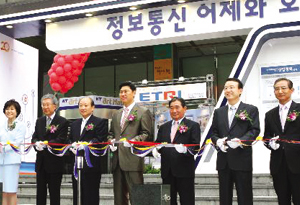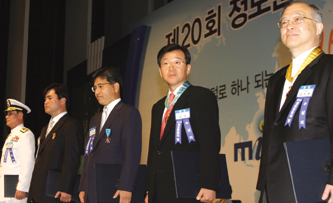Month of Information
and Culture Comes of Age
Korea set to evolve into a global IT powerhouse
 The Month of Information and Culture, designed to celebrate the explosive development of the domestic information communication technology industry is coming of age. In commemoration of the 20th anniversary of the Month of Information and Culture, an exhibition of historical records of the domestic ICT industry, titled "Yesterday and Today of ICT"raised the curtain in the front of the Ministry of Information and Communication Building in downtown Seoul on June 1st as the starter of diverse commemorative events.
The Month of Information and Culture, designed to celebrate the explosive development of the domestic information communication technology industry is coming of age. In commemoration of the 20th anniversary of the Month of Information and Culture, an exhibition of historical records of the domestic ICT industry, titled "Yesterday and Today of ICT"raised the curtain in the front of the Ministry of Information and Communication Building in downtown Seoul on June 1st as the starter of diverse commemorative events.
The exhibition, which lasted until June 20th, offered spectators a chance to look back on how information has changed Korea on the occasion of the 20th anniversary and take a look into the current status of the ICT industry.
Minister of Information and Communication Rho Jun-hyong said in his commemorative speech during a ceremony marking the 20th anniversary of the Month of Information and Culture at the COEX Auditorium on June 7th,
 "Korea is striving to evolve into a global IT powerhouse that sets a good example to other nations."The nation should spare no efforts to make Korea a "warm, digitalized powerhouse"based on mutual care and trust, citing such syndromes like cyber addiction for instance, the minister noted.
"Korea is striving to evolve into a global IT powerhouse that sets a good example to other nations."The nation should spare no efforts to make Korea a "warm, digitalized powerhouse"based on mutual care and trust, citing such syndromes like cyber addiction for instance, the minister noted.
The month of June is the Month of Information and Culture. The first Month of Information and Culture was observed in 1988 across the nation to commemorate the explosive development of the ICT industry. Computers were first imported into the country in June of 1967 by the Statistics Bureau of the then Economic Planning Board and the automation of the telephone system was completed in June 1987, making June the month of great turning point in the country's ICT industry.
The domestic ICT industry has made strides during the past two decades to the extent that the country topped the Digital Opportunity Index for the third straight year to make Korea emerge as an IT powerhouse. The progress is owed to a number of important projects in the industry that were set up to speed up the development of the industry including "Cyber Korea 21," "IT839 Strategy," and other strategies. However, the other side of the coin behind the brilliant development of the ICT industry is that Korea is suffering from such symptoms as cyber addiction and a digital divide. The positive side shows that the country has become a top Internet user country with its people upgrading their information capacity, meaning that social participation of the people through the Internet has expanded. Netizens operate Internet cafes, and mini-home pages, among others, to actively exchange their opinions and in the process, created their own languages with great pleasure.
Mobile phones have raised the level of communication across the country to new heights, and in the process, a popular export item, making a great contribution to the economic growth. However, the excessive use of the Internet and mobile phones has become a serious concern in the country.
 The Internet has become a medium to spread wild rumors and anti-social opinions, in addition to being an outlet for private information, game addictions and illegal gambling. The rapid information created disparities among regions and information gap among different brackets in society.
The Internet has become a medium to spread wild rumors and anti-social opinions, in addition to being an outlet for private information, game addictions and illegal gambling. The rapid information created disparities among regions and information gap among different brackets in society.
The exhibition offered diverse things to see and experience with such booths as "ICT Policy Publicity Zone," "Historical Relics Zone," "12 Landscape View and Chronology Zone,"and "Experience/Event Zone."Visitors to the ICT Policy Publicity Zone got a glimpse into such accomplishments as Korea's development of mobile broadband Internet service, WiBro and Digital Multimedia Broadcasting (DMB) for the first time in the world as well as the current government's policies on the ICT industry and its achievements.
The Historical Relics Zone highlighted historical documents on modern IT history during Chosun Dynasty and the development of such technologies as telephone exchange system and CDMA exchange system, key technologies behind Korea's ICT myths, as well as advanced mobile phones.
 The 12 Landscape View and Chronology Zone showed Korea's history of each ICT theme and the chronology of the development of Korea's ICT industry at a glance.
The 12 Landscape View and Chronology Zone showed Korea's history of each ICT theme and the chronology of the development of Korea's ICT industry at a glance.
Public spectators were given opportunities to enjoy diverse experiences, including transmitting the Morse code, making of their own postage stamps, at the Experience/Event Zone.
During the anniversary ceremony, 43 persons and one organization were presented with a variety of orders, medals and other citations in recognition of their contribution to the development of the ICT industry and information culture.
Lawyer Kang Ji-won was conferred on the Order of Civil Merit, Moran for his contribution to spreading a sound information culture while serving as a first-term member of and then sixth chairman of Korea Internet Safety Commission. nw
(clockwise) Minister of Information and Communication Roh Jun-hyong delivers a speech during the anniversary ceremony of the Month of Information and Culture. A ceremony for opening the anniversary event of the Month of Information and Culture, titled "Yesterday and Today of ICT."Award winners in recognition of their contribution to information culture.
3Fl, 292-47, Shindang 6-dong, Chung-gu, Seoul, Korea 100-456
Tel : 82-2-2235-6114 / Fax : 82-2-2235-0799